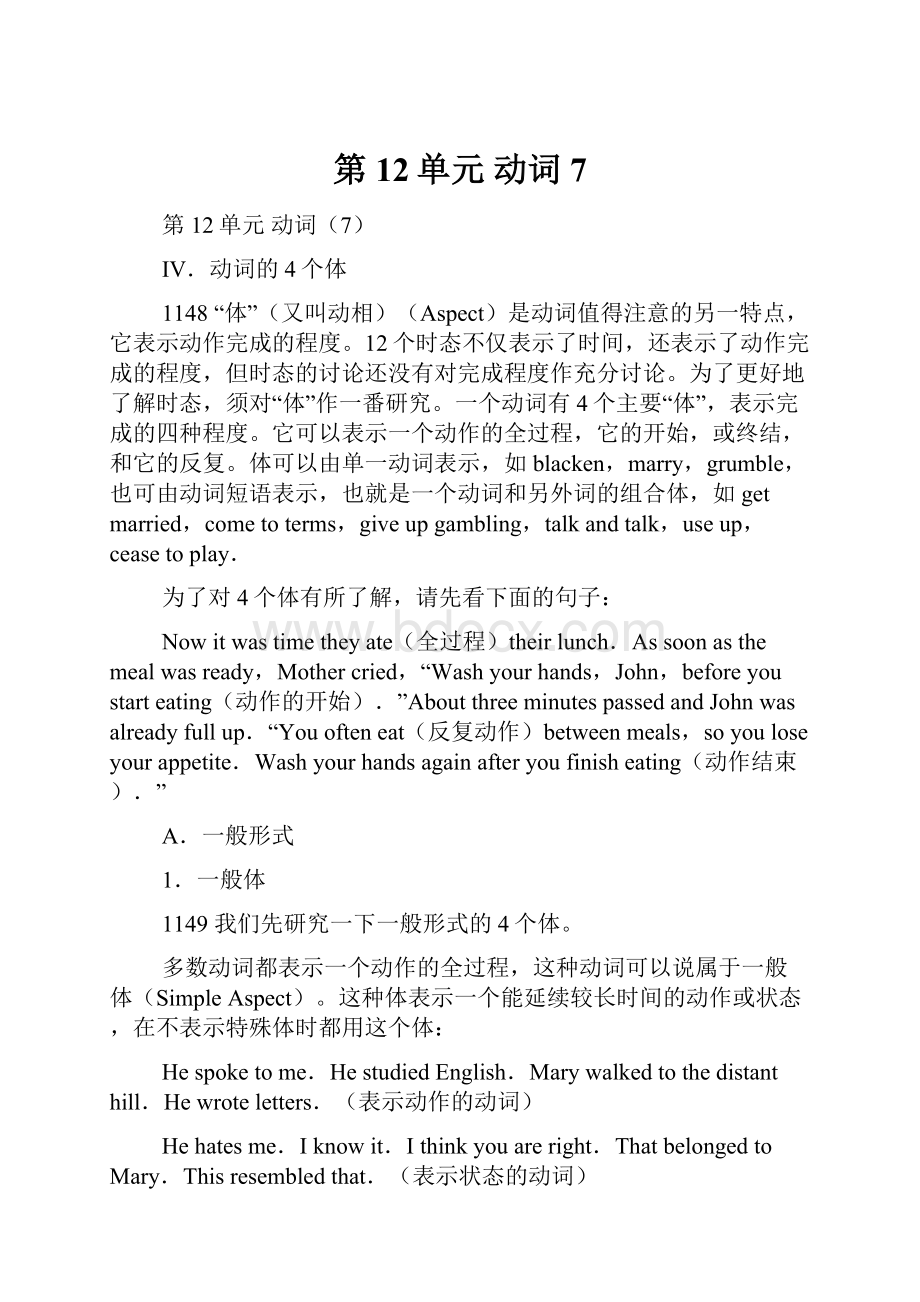第 12单元 动词7.docx
《第 12单元 动词7.docx》由会员分享,可在线阅读,更多相关《第 12单元 动词7.docx(52页珍藏版)》请在冰豆网上搜索。

第12单元动词7
第12单元动词(7)
Ⅳ.动词的4个体
1148“体”(又叫动相)(Aspect)是动词值得注意的另一特点,它表示动作完成的程度。
12个时态不仅表示了时间,还表示了动作完成的程度,但时态的讨论还没有对完成程度作充分讨论。
为了更好地了解时态,须对“体”作一番研究。
一个动词有4个主要“体”,表示完成的四种程度。
它可以表示一个动作的全过程,它的开始,或终结,和它的反复。
体可以由单一动词表示,如blacken,marry,grumble,也可由动词短语表示,也就是一个动词和另外词的组合体,如getmarried,cometoterms,giveupgambling,talkandtalk,useup,ceasetoplay.
为了对4个体有所了解,请先看下面的句子:
Nowitwastimetheyate(全过程)theirlunch.Assoonasthemealwasready,Mothercried,“Washyourhands,John,beforeyoustarteating(动作的开始).”AboutthreeminutespassedandJohnwasalreadyfullup.“Youofteneat(反复动作)betweenmeals,soyouloseyourappetite.Washyourhandsagainafteryoufinisheating(动作结束).”
A.一般形式
1.一般体
1149我们先研究一下一般形式的4个体。
多数动词都表示一个动作的全过程,这种动词可以说属于一般体(SimpleAspect)。
这种体表示一个能延续较长时间的动作或状态,在不表示特殊体时都用这个体:
Hespoketome.HestudiedEnglish.Marywalkedtothedistanthill.Hewroteletters.(表示动作的动词)
Hehatesme.Iknowit.Ithinkyouareright.ThatbelongedtoMary.Thisresembledthat.(表示状态的动词)
Heisacrazyfellow.Thiscityseemsdirty.Shelookssad.
Thisfruittastessweet.(某些系动词)
2.起始体
1150先看下面这段短文:
Thesetwocountrieshadbeenatpeaceformany,manyyears.In1820,however,theyharshlycriticizedeachother,sotheirrelationsweretense.Afterayear,theyfoughtawar,whichcontinuedforfortyyears.Thentheirdiplomatsdiscussedhowtoendthebloodshed.Theytalkedfortenyearsbeforetheyagreed.
可以看出,斜体动词,从上下文判断,都表示重要的变化,但这些一般体的动词没有把变化清楚讲出。
现在再看下面短文,注意斜体动词及动词短语,如何清楚表现出新动作或状态的开始。
这些强调动作开头的动词或动词短语可说属于起始体(IngressiveAspect)。
由于它们也表示一个短暂的动作,这个体也可称作短暂体(InstantaneousAspect):
Thesetwocountrieshadbeenatpeaceformany,manyyears.In1820,however,theybegantoharshlycriticizeeachother,sotheirrelationsbecametense.Afterayear,theystartedawar,whichcontinuedforfortyyears.Thentheirdiplomatscametothetabletodiscusshowtoendthebloodshed.Theytalkedfortenyearsbeforetheyarrivedatanagreement.
1151从上面例子中可以看出,英语中有许多对动词或动词短语,如were和became,foughtawar和startedawar,agreed和arrivedatanagreement,意思相近,却属于不同的体。
在语法上,用哪种体都对,但在修辞上,选择能表示确切的体的词则更好一些。
在下面例子中,起始体由“i”表示,一般体由“s”表示:
a)Iknow(s)loveissacred;Ilearned(i)itwhenIwasamerechild.(起始体或一般体都可由一单个动词表示)
(若把know和learned,也就是一般体和起始体的位置互换,会使句子显得很别扭,尽管它们的意思相同。
)
Ihave(s)averylovelydog,andIgot(i)itfromafriend.
Ikeep(s)mybooksontheshelves,andIput(i)thembackeverytimeIusethem.
Ihaveemployed(s)thissecretaryforalongtime,andIengaged(i)herin1965.
Heborrowed(i)tenthousandpoundsfiveyearsago,andnowhestillowes(s)mefivehundred.
Iarrived(i)thereonApril1,andstayed(s)theretwomonths.
b)“Iknow(s)Johnverywell.”“Whendidyoumakehisacquaintance(i)?
”(起始体可以由动词短语表示)
AtfirstIthought(s)thatnobodycoulddothat,butthenitoccurred(i)tomethatJohncould.
Ican‘tremember(s)mypromiseunlessIamreminded(i)ofit.
Sincehewasfrightened(i)byaghost,hehasbeenafraid(s)togointhedark.
Heisinlovewith(s)Mary.Hefellinlovewith(i)herlastyear.
c)Hecannotwakeup(i)earlythismorning,becauselastnighthelayawake(s)allnight.
“Ihavenotseen(s)himforalongtime.Idon’trememberwhenIlostsightof(i)him.”“ButIcaughtsightof(i)himamongthecrowdtheotherday.”
Everyonelaughedandlaughed(s),exceptMary,whokeptseriousafewmoments,butthenburstforthlaughing(orcrying)(i).
Afterhespoke(s)tomefortwohours,Ibrokesilence(i).
d)Askhertowait.I‘llputon(i)mycoat.Itwouldbeimpolitetowear(s)thesepajamas.
Igotobed(i)atten,fallasleep(i)abouthalfanhourlater,andIsleep(s)eighthours.
Hehasheld(s)thepoliticalpowerfortenyears.
Heseizedholdof(i)itfromanotherparty.
ButIbelievehewilllosehisholdof(i)itverysoon.
Youcando(s)thejob,butwhencanyoubegin(orstart,commence)(i)it?
(commence为书面语)
Itiseasytomanage(orrun,handle,conduct)(s)thebusiness,butdifficulttostart(i)it.
Allofthemhadalreadystood(s)infrontoftheprincipal,andthenItookmyplace(i)besideLily.
e)Iamsick(s).Igotsick(i)twodaysagowhenIwalkedintherain.(有些系动词表示一般体,有些表示起始体。
)
Helooksold(s).Hegrewold(i)lastyear,whenhelosthiswife.
“Sheappearsmad(s).”“Sheis.Sheranmad(i)becauseallofherfoursonswerekilledonthebattlefield.”
“Shelookspale(s)”“Sheturnspale(i)everytimeshegetsfrightened.”
Heisarobber(s).Heturnedrobber(i)merelyforrevenge.
Hecommencedwriter(i)inthebeginningofthiscentury,andisawriter(s)ofinternationalfametoday.
Heisavictim(s)oflove.Hedoesnotknowhowandwhenhefellavictim(i)tohercharms.
Athingbecomesofgreatimportance(i)themomentyouTHINKitis(s).
f)“Imustsetitright(i).”“Yes,ifyoudonotthinkitright(s).”(起始体或一般体也可由宾补动词和宾语补语表示出来)
Thechildrenmakethefloordirty(i).Theirmotherleavesitdirty(s)anddoesn’tcare.
“Iconsiderthesituationdifficult(s)”“Butwhorendersitso(i)?
”
Ifounditclean(s)enough.Maybethemaidhadwasheditclean(i).
(其他起始体动词还有paintitred,cutitshort,raiseithigh,breakitopen,etc.)
Letussettheballflying(=maketheballfly)(i).
Thisaccidentsetusthinking(i).
Hestartedthemachinegoing(i).
1152一般体的动词可以在前面加一个begin或其同义词使它变为起始体:
Webegan(orstarted)tostudypoetry.
Webegan(orstarted)playingagame.
Hecommencedlookingforawife.
IstartedintowriteastoryafterIhadlearnedtherules.
Westartedouttopractiseassurgeonsafterweweregraduated.
Wesetabouttorepairtheroadimmediatelyafteritwasbombed.
Itsetintosnow(orsnowing).
Wefelltoeatingtheroastpigeonsassoonaseveryonewaspresent.
Hecouldfindnoothersolace,sohetooktodrinking.
Hewasextremelystubborn,butfinallyhecametoseehisownfault.
Atfirstheneglectedmyadvice.Atlasthegottobelieveit.
Hehadbeenaplayboyfortwoyears.
Intheendhegrewtoknowthedanger.
1153包含to或into的动词短语可能是起始体,除非这些介词只表示方向:
a)Theycametoblows(=begantofight),cametoanunderstanding(=begantounderstandeachother),cametologgerheads(=begantoquarrel),cametoman‘sestate(=begantoreachmanhood).
Itcametothefront(=begantobeprominent),cametoourknowledge(=begantobeknowntous),cametolight(=begantobedisclosed),cametoastandstill(=begantobestagnant).
Theywenttolaw(=beganasuitinalaw-court),wenttobed(=begantorest),wenttobad(=begantobedebauched),rosetoeminence(=begantobeeminent).
b)Itcameintoforce(=begantobeenforced),cameintouse(=begantobeused),cameintoexistence(=begantoexist),cameintosight(=begantobeseen).
TheyfellintocompanywithJohn(=begantoknowJohn),fellintoerror(=begantomakemistakes),fellintotheshade(=begantobeobscure),fellintothehandsoftheenemy(=begantobecontrolledbytheenemy).
Theyenteredintocorrespondence(ornegotiation,agreement,awar,acontract)withus(=begantocorrespond,negotiate,etc.,withus).
Theysankintopoverty(=begantobepoor).
Theyturned(orchanged,translated,transformed)thisintothat.
Heunited(ormixed)thesethingsintoone.
Hedividedoneintomany.
Itgrew(ordeveloped,degenerated,ripened)intosomethingdifferent.
1154由take开始的动词短语可能是起始体:
Hetookafancy(oraliking)toit(=begantolikeit),tookaninterestinit(=begantonoticeit),tookoverthegovernment(=begantocontrolthegovernment),tookchargeofthebusiness(=begantomanageit),tookpityonhim(=begantopityhim),tookpossessionof(=tookover)theproperty.
1155祈使句中的谓语动词(即使是一般体动词)也总是起始体,因为动词表示的动作要求开始进行:
Comehere.Doitatonce.Loveyourneighbours.
Hateyourenemy.Knowyourself.Beagoodboy.Leteverybodymindhisownbusiness.
1156有些一般体动词偶尔也可用作起始体动词:
Whenhetoldmethenews,Iwasaware(=begantoknow)thattherumourwasfalse.
Hesawthebrokenwindowandwas(=became)immediatelyangry.
Sincehewas(=got)married,hehasbeenadifferentman.
Heisjustdead(=hasjustdied).
Ifirstknewhim(=madehisacquaintance)in1960.
Helaydownandslept(=fellasleep).
Youwillseeherandlove(=fallinlovewith)her.
IhavethoughthimagoodworkersinceIemployed(=engaged)him.
3.终结体
1157有些动词或动词短语,表示一个动作的结束,这类动词则属于终结体(TerminativeAspect)。
1158有些系动词表示终结体:
Heproved(tobe)honest.(=Hewasfinallyfoundtobehonest.)
Shegrewup(tobe)aprettygirl.
Heturnedout(=proved)agoodman.
Hecameoutadifferentman.
Hewentoffavictor.
Heemergedavictor.
1159一般体的动词,如在前面加finish或其同义词,可以变为终结体:
Weshouldnowstopquarrelling(=quarrelnomore).
Canbegiveupsmoking?
Pleasequit(orleaveoff)playingtricks.
Heceasedtosell(orselling)appleslongago.
1160包含有up,down,out,through,away等副词的动词短语可以表示终结体,除非这些副词表示方向:
a)Everythingwasburnedup.(up表示“彻底地”)
Theriverdriedup.
Hetied(orfastened,locked,chained,sealed,screwed,packed,shut,folded)itup.
Heset(ormix,fix)itup.
b)Thetempestdieddown.(down表示减少到较少程度或完全消失)
Theclockrandown.
Theshoesworedown.
Thefactory(was)closeddown.
Therevolution(was)calmeddown.
Slowdownthecar.
Thefireburneddown.
Imustquietdownhisexcitedmind.
c)Iwillcarrythroughthetask.(through表示完成)Shegotthrough(=passed)theexam.
Hewillreadthebookthrough.
Isawthematterthrough(fromthebeginningtotheend).
Gothroughwiththenovel.
Whenwillyoubethroughwith(=finish)mybook?
d)Thefireburneditselfout(orburnednomore).Shehadhersleepout(=slepttoherheart’scontent).Hesatouttheplay(=satuntilitwasfinished).Hesleptoutthenight.
Hecan‘tholdout(=enduretotheend).
Thefire(orThecup,Thepurse,Thecopyright,Theweek)isout(=isfinished).
e)Thewaterboiledaway.
Hislasthopefadedaway.
1161包含till,to或into的动词短语,若表示动作的结果或结束,也属于终结体:
Helivedtillninety-nine.
Heworkeduntilmidnight.
Hewasbeatentilldeath.
Shecriedherselftosleep.
H